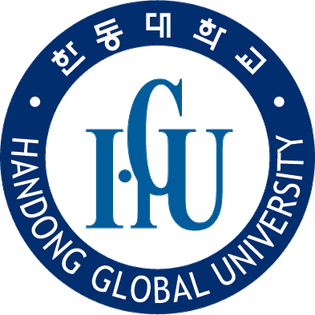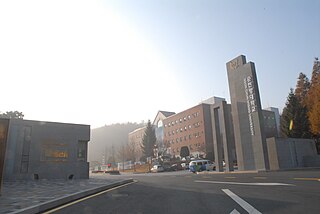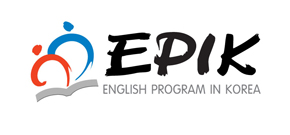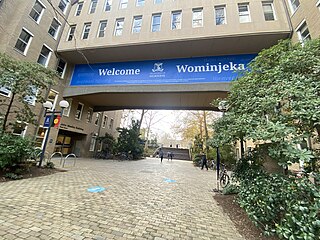
International students, or foreign students, are students who undertake all or part of their tertiary education in a country other than their own.
The Fulbright Program, including the Fulbright–Hays Program, is one of several United States Cultural Exchange Programs with the goal of improving intercultural relations, cultural diplomacy, and intercultural competence between the people of the United States and other countries through the exchange of persons, knowledge, and skills. Via the program, competitively-selected American citizens including students, scholars, teachers, professionals, scientists, and artists may receive scholarships or grants to study, conduct research, teach, or exercise their talents abroad; and citizens of other countries may qualify to do the same in the United States.
Ajou University is a private research university located in Suwon, Gyeonggi Province, South Korea. It was founded in 1973 by Park Changwon.

Hankuk University of Foreign Studies is a private research university based in Seoul, in South Korea. The university currently teaches 45 foreign languages. In addition, it contains studies in humanities, law, political science, social sciences, business, medical science, natural sciences, and engineering.

Yeungnam University is a private research university located in Gyeongsan, North Gyeongsang, South Korea. The university's predecessors, Taegu College and Chunggu College, were founded in Daegu in 1947 and 1950 respectively. In 1967, the two colleges were merged by President Park Chung Hee to form Yeungnam University. In 1972, the university's new main campus opened in Gyeongsan east of Daegu. The university includes colleges of Law and Medicine as well as a university hospital. It ranked 1st in the rate for passing the bar exam for the second straight year (2015~2016), it also ranked 6th in providing CEOs in Korea's top 100 companies (2015), and 6th in providing the CEOs in Companies listed on KOSDAQ (2014). Yeungnam University is ranked 501 in the Academic Ranking of World Universities by Shanghai Jiao Tong University.

Chonnam National University is one of ten Flagship Korean National Universities located in Gwangju and South Jeolla Province, South Korea. In March 2006, Yeosu National University merged with Chonnam National University to become a satellite campus. CNU ranked the 10th nationwide and the 420th worldwide in world university rankings in the CWUR. It was also the 1st among the nine Korean national flagship universities in "Asia’s Top 75 Most Innovative Universities" in 2017 Reuters. CNU has also expanded its global reach by establishing partnerships with 499 Universities in 62 countries as of 2019.

Korea University is a private university in Seoul, South Korea. Established in 1905, the university was named after Goguryeo. The university is one of the SKY universities.

The University of Seoul is a municipal public university in Seoul, South Korea. UOS is famous in South Korea for a very large number of alumni working as national or municipal government officials in South Korea. UOS specializes in urban science and has top-tier programs in environmental engineering, taxation, transportation engineering, urban planning and design, landscape architecture, and urban administration.

Konkuk University is a South Korean private university founded in 1946 and it is one of the top universities in South Korea. The university was founded based on three virtues: sincerity, fidelity, and righteousness.

Handong Global University is a private evangelical four-year university located in Pohang, North Gyeongsang, South Korea.

The Test of Proficiency in Korean is a test to measure the Korean language proficiency of non-native speakers in South Korea. This examination system was introduced by the South Korean government in 1997 and conducted by a branch of the Ministry of Education of the country.

Soonchunhyang University (SCH) is a private university in Asan, South Korea.
Koreans in France numbered 29,367 individuals as of 2014, making them the 3rd-largest Korean diaspora community in Western Europe, according to South Korea's Ministry of Foreign Affairs and Trade.
Scholarships in Korea are assistance programs aimed at helping students in or from South Korea pursue their education. Scholarships come in different forms based on factors such as the duration of study and the applicant's academic qualifications. They have various root aims, including recognizing academic achievement, promoting research and knowledge in specific fields, promoting global academic exchange, and reducing the financial burden on individuals.

English Program in Korea (EPIK) is a program to improve the English speaking abilities of students and teachers in South Korea, to foster cultural exchanges, and to reform English teaching methodologies in South Korea. It is affiliated with the Korean Ministry of Education and is operated by the National Institute for International Education. Established in 1995, EPIK encourages cross cultural exchange while promoting the development of English language competence for Korean students.
Koreans in the Netherlands form one of the smaller Korean diaspora groups in Europe. As of 2022, 9,469 people of Korean origin lived in the Netherlands.
The Korean Government Scholarship Program, or KGSP, is an academic scholarship funded and managed by the National Institute for International Education (NIIED), a branch of the Ministry of Education in South Korea. This scholarship provides non-Korean scholars with the funding and opportunity to conduct undergraduate or postgraduate level studies in South Korea after completing one year of intensive Korean language studies. Since its conception in 1967, over 3,000 students from 148 countries have successfully completed the scholarship program.
Teaching English as a second (TESL) orforeign language (TEFL) and teaching English to speakers of other languages (TESOL) are terms that refer to teaching English to students whose first language is not English. The terms TEFL, TESL, and TESOL distinguish between a class's location and student population, and have become problematic due to their lack of clarity. TEFL refers to English-language programs conducted in countries where English is not the primary language, and may be taught at a language school or by a tutor. For some jobs, the minimum TEFL requirement is a 100-hour course; the 120-hour course is recommended, however, since it may lead to higher-paid teaching positions. TEFL teachers may be native or non-native speakers of English.

Australia ranked third in top study abroad destinations with a total market value of over 5 billion AUD generated by international students in 2018. In 2018, 869,709 international students were enrolled in educational programs in Australia, which was about 8.8% higher than the amount in 2017 (799,371). They come to gain a high-quality education, possibly immigrate, or to experience a different life. Each year, many new international students will enrol in Australian courses and add to the already significant international student body around the country.

Korean as a foreign language is the study of the Korean language by anyone who is not a native speaker, regardless of Korean ethnicity.












